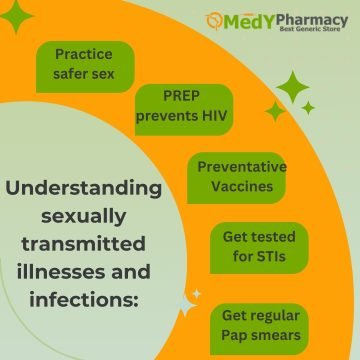Introduction:
Discussing sexual health and needs is a critical component of overall well-being, especially for women. It includes comprehending the physical, emotional, and relational components of sexuality, as well as feeling at ease expressing desires, and boundaries with a partner.
Healthy sex is but one part of sexual wellness. The whole of an individual’s health and well-being.
- Physical
- Emotional
- Mental
- Social
This is a broad topic. It encompasses not only people, couples, and families, but also entire communities and cultures.
- Sexuality and gender identity
- Knowledge of anatomy, reproductive health, and fertility
- Understanding the risks inherent in sexual activity.
- Respectful interactions devoid of compulsion and violence
- Enjoyable and secure sexual encounters
- Access to good healthcare.
Access to instructional resources on the realities of self-care as it applies to sexual activities
- Safer sexual behaviors
- Having regular screenings for sexually transmitted diseases (STIs)
- Choosing vaccinations and drugs
- Using Proper Contraception
- Receiving medical care for reproductive health issues.
- What to do about low libido.
A Little about Women’s Sexual Health
Many individuals believe that your body’s physical need for sex drives sexual action, which leads to sexual arousal and climax. Many women, particularly those over the age of 40 or who have gone through menopause, may not have physical desire as their primary motive for sex. A woman may be driven to have sex to feel closer to her lover or to express her emotions.
Sexual enjoyment is unique to each individual. Many factors influence sexual response, including your feelings toward your partner, your self-esteem, your health, and your religious and cultural heritage. If you are concerned about your sex life or simply want to improve it, discussing it with your partner is a smart starting step.
So, What Exactly Is Sexuality?
Sexuality is concerned with our sexual sensations and ideas, who we are attracted to, and our sexual behaviors. We can find other people physically, sexually, or emotionally attractive, and all of these characteristics are part of our sexuality.
Sexual dreams, fantasizing about someone or a sexual act, kissing, touching, masturbating, being naked with someone, oral sex, or having penetrative sexual intercourse are all ways to explore and express your sexuality throughout time.
Women’s sexuality, like everyone else’s, can evolve throughout time. At moments in your life, you may feel incredibly sexual, and at others, sex may be the furthest thing from your mind. That’s perfectly typical.
Sexual Development:
Sexual feelings might arise during puberty or adolescence. This could include being attracted to other individuals, whether male or female, experiencing sexual fantasies or dreams, or exploring your body sexually through masturbation. This is a typical stage of development. While some people choose to have their first sex in high school, others may wait a long time or never become sexually active. That’s perfectly fine.
The most essential thing is that you can make the best decisions for yourself while yet feeling protected and appreciated.
Understanding sexually transmitted illnesses and infections:
Sexually active people are more likely to get sexually transmitted illnesses, sometimes known as STIs.
Sexually transmitted infections can be contracted during vaginal, anal, or oral intercourse.
The risk increases with the number of sexual partners, yet an STI can be contracted the first time you have intercourse with a partner.
However, understanding how to protect yourself and your partner might help lower your chances of developing an STI. Proper sexual activity protection can also assist prevent the spread of sexually transmitted infections.
STI prevention is an important aspect of sexual health, but there is much more to sexual health than simply being disease-free.
- Have a decent understanding of sex
- Having a consensual and healthy relationship with your sexual partner.
- Enjoy the sex you’re having.
While keeping the big picture of sexual health in mind, read on to learn about best practices for keeping you and your sexual partner safe from developing or transmitting STIs.

- Practice safer sex
Safer sex practices frequently involve employing body barriers to keep you and your partner from sharing bodily fluids.
- External condoms.
- Internal condoms
- Dental dams.
- Gloves
These strategies help avoid STIs, which are spread by bodily fluids such as:
- Semen
- Blood
- Vaginal secretions
- Saliva
Barrier measures can protect you and your partner from STIs such as:
- HIV
- Gonorrhea
- Chlamydia
- Trichomoniasis
- Hepatitis A, B, and C
Barrier measures are less efficient in preventing STIs transferred through skin-to-skin contact, but they can still help lower your chances.
- Syphilis
- HPV (Human papillomavirus)
- Herpes simplex virus (HSV).
This mechanism also allows pubic lice to spread from one individual to another.
Use them whenever you have sexual contact or penetration to protect yourself and your partner.
- Oral sex
- Vaginal sex
- Anal sex
Some sexually transmitted infections (STIs), such as:
- Syphilis
- Hpv
- Herpes
- Gonorrhea
- Chlamydia
According to research, the number of oropharyngeal cancer diagnoses caused by HPV infections has been steadily increasing.
Other mouth and throat cancers, such as those in the mouth, salivary glands, larynx, lip, or nose, have not been linked to HPV infection.
- PrEP prevents HIV.
PrEP, or pre-exposure prophylaxis, is a prescription medicine that helps prevent HIV transmission during sex without a barrier device or when using shared needles. It is taken before any potential HIV exposure.
PrEP does have adverse effects, but they normally go away with time.
- Headache
- Diarrhea
- Nausea
- Fatigue
- Stomach discomfort
You intend to have intercourse without a condom with a partner with HIV or another STI
You and your sexual partner share needles
In general, your sexual partner does not employ barrier methods during sex with you or other partners.
Your sexual partner owns a penis and has sex with other penis owners.
- Preventative Vaccines
- HPV
- Hepatitis B
- Hepatitis A
Cervarix protects against the two HPV strains that are responsible for the majority of cervical cancers.
Gardasil protects against these two strains, as well as the two strains responsible for the majority of genital warts.
Gardasil 9 covers the same four HPV strains as Gardasil, but it also includes five “high-risk” strains, for a total of nine.
These immunizations work best when administered before having sex. It is usually suggested that young women and men begin vaccines at the age of 11. You can still get vaccinated till your late 20s.
For persons under the age of 26, health insurance usually covers the cost of vaccinations. Though the FDA has licensed the vaccine for use in persons up to the age of 45, insurance coverage varies as people become older.
Hepatitis B vaccinations are typically administered during infancy. Hepatitis B causes liver problems. It can be spread through sexual intercourse without a barrier, as well as through blood or blood-derived products.
Hepatitis A is rarely transferred during sex, however, it can be spread through oral-anal contact.
- Get tested for STIs.
Screening can help lower the likelihood of developing an STI. Regular STI testing can assist in minimizing the long-term repercussions of an infection.
Bacterial STIs, such as gonorrhea and chlamydia, can have major health consequences if not treated, including infertility. Screening can assist in preventing these issues.
Before beginning a sexual relationship, schedule a test date with a new partner. That way, you’ll know if you’re putting each other in danger, and therapy can be administered if necessary.
STIs can afflict people of any age or relationship status.
- Get regular Pap smears
Pap smears are a common aspect of women’s healthcare to check for cervical cancer, and they are advised beginning at age 21.
This test detects early indicators of cervical abnormalities that, if unchecked, may progress to cervical cancer. Precancerous alterations can be detected and treated before they progress to a dangerous condition.
This is responsible for almost all occurrences of cervical cancer. As a result, practicing safer sex can help lower your risk of developing cervical cancer.
This can also assist in minimizing the risk. There are numerous types of cancer-causing HPV, which is why vaccination, safer sex practices, and frequent Pap screenings are all required.
Invasive cervical cancer and its treatment can have serious consequences for your entire health, particularly your sexual health.
In many circumstances, it can lead to infertility. It is critical to detect cervical abnormalities early and consult with your doctor about them. Taking this action can assist in preventing subsequent difficulties.
Sexual Orientation and Gender Identity
Sexual orientation is a means of describing who you are most sexually attracted to:
- A woman who is predominantly attracted to other women may call herself a lesbian.
- Men who are predominantly attracted to other men identify as gay.
- Asexuality denotes that you lack strong sexual feelings in general.
- Women who are predominantly drawn to men are heterosexual.
Who you are attracted to can vary over time. Some women may be initially attracted to men but later become attracted to other women. Some ladies have the exact opposite experience. The most essential thing to remember is that it is normal to be attracted to different sexes throughout your life or to not feel sexual at all.
Gender identity can be related to sexuality. For example, if a person is born feminine but identifies as a boy or man, he can identify as heterosexual if he is predominantly attracted to women or gay if he is primarily drawn to males.
Discriminating against someone because of their sexual orientation or gender identity is never right. Everyone deserves to be treated with respect, and no one should pressure you into doing something you don’t want to do.
Is My Sex Life Going Well?
It’s natural to ask if your sexual behavior is healthy. You may be wondering if you are having “enough” sex or how your sex life compares to others.
There is a huge variety in terms of how frequently people think about and have sex, how frequently they have an orgasm, and how much they enjoy sex. Changes in sex and desire are also normal throughout life, such as during menopause, pregnancy, or important life events like marriage or motherhood.
Libido issues are more prevalent in women between the ages of 40 and 60.
When it comes to your sex life, how you feel is everything. The basic line is that if you’re satisfied and happy with your sexual life, it’s healthy. However, if your sex life causes misery, sadness, or worry, or has detrimental effects — either for yourself or for others — you may have a sexual health condition that requires attention.
What Types Of Sexual Health Issues Might Women Encounter?
If you’ve ever been dissatisfied with your sex drive, ability to be aroused, or capacity to enjoy sex, you’re not alone. According to a 2016 meta-analysis, over 40% of premenopausal women worldwide have encountered sex-related difficulties.
- Libido Problems
A low libido is one of the most frequent sexual issues, affecting more than 28% of women globally. People with a low libido are frequently less interested in sex than they would want to be, and they have few sexual fantasies. Low libido may also reduce your desire to masturbate or initiate sex with a partner.
- Arousal Problems
People with arousal issues have difficulty getting physically “turned on” before or during sex. You may have difficulty getting lubricated (wet), and your erogenous zones may feel less responsive. You may also become preoccupied during sex or find it less stimulating or fulfilling.
- Trouble with Orgasm
Orgasm difficulties arise when you are dissatisfied with the frequency or quality of your orgasms. You may have difficulty attaining orgasm, take an unusually long time to orgasm, or discover that your orgasms are less pleasurable than usual, even while sexually stimulated.
- Pain or Discomfort
Some women feel pain or discomfort during sex, genital contact, or other sexual touching. Muscle spasms or movement issues can potentially complicate sexual penetration and posture.
- Sexual Issues
Many drugs and chronic conditions can result in sexual issues in all of the categories listed above.
Women and Sexual Pleasure
Many factors might influence the amount of pleasure you have from a sexual session,
- How comfortable and contented you are.
- How you are feeling about your body at the moment.
- Maintaining respectful conversation with your sexual relationship.
The culture or environment surrounding you, as well as that of your partner, can influence your views and expectations around sex, sexuality, and sexual enjoyment. This could be good, bad, or neither. For example, it was once assumed that women should not enjoy sex at all and that the sole purpose of sex was to have children.
Women’s Sexual Health: Begin by Discussing Your Needs
You may find it difficult to express your sexual wants, but your spouse cannot read your mind. Sharing your views and expectations about your sexual encounters might bring you closer together and help you attain more sexual pleasure.

- To Get Started
Admit that you are uncomfortable. If you are nervous. Opening up about your issues may help you begin the conversation. Tell your partner if you’re nervous about communicating your desires, and ask for assurance that your spouse is receptive to the talk.
- Start Speaking
Talking could help you gain confidence and comfort.
- Create a Time Restriction
Avoid overpowering each other with extended conversations. You may find it simpler to stay inside your emotional comfort zones if you have 15-minute chats about the subject.
- We Communicate Regularly
Your sex talks will become easier as you chat more.
- Utilize A Book Or A Movie.
Women’s sexual health, or suggest chapters or portions that meet your concerns. You might also utilize a movie scene to kick off a discussion.
The Effect of Films and Pornography on Sexual Satisfaction
Men can be portrayed as dominant or forceful during sex in movies and pornography, while women are portrayed as submissive or passive.
Some films and pornography appear to depict women experiencing many orgasms as soon as sex begins. This can create false expectations for women and their sexual partners, as well as circumstances in which people believe they are carrying out sexual scripts created by someone else without experiencing any pleasure.
Sex Should Make You Feel Good
While it is natural to experiment and discover what you prefer, keep in mind that sexuality and sex should be enjoyable. Nobody has the right to make you feel insulted, afraid, or uncomfortable during sex.
It might be difficult to discuss what feels good with a sexual partner, but communication is essential for having a mutually happy sexual encounter.
Orgasm is an indication of strong sexual pleasure or stimulation. An orgasm can be described as an explosion of sexual pleasure that lasts a few seconds or minutes. Orgasms are most commonly caused by stimulation in people with female genitals. Not everyone has orgasms having intercourse with another person.
It is OK to have a large number of sexual partners during your life, as well as a few or none.
Menstruation and Reproductive Health
Women typically believe that pelvic pain, such as cramping, is normal. They’ve been told that menstruation is painful. As a result, people may not communicate their suffering to their doctor.
You should not have to suffer from severe pelvic discomfort or abdominal cramps. Severe period pain could indicate an underlying gynecological or gastrointestinal health condition.
- Endometriosis
Endometriosis is a painful disorder in which tissue that resembles the uterine lining grows outside the uterus.
The endometrium is the term used to describe the uterine lining. It supplies blood and tissue during menstruation.
Endometrium-like tissue deposits on organs and tissues throughout the abdomen and pelvis in patients with endometriosis. It can be exceedingly uncomfortable.
- Severe menstrual pain
- Sexual agony
- Pain during bowel motions.
- Excessive bleeding
- Bleeding in-between periods
Endometriosis pain can often be addressed. Treatment differs depending on your other health concerns. The treatment may be determined by your family planning goals.
- Anti-inflammatory drugs
- Hormonal Therapy
- Surgery to remove the extra tissue.
- Hysterectomy (uterine removal)
- Fibroids
Fibroids are noncancerous uterine tumors. However, the majority of women will never require medical attention.
Fibroids aren’t always uncomfortable or bothersome, and they don’t raise your risk for cancer. Fibroids can cause infertility, however, many women can conceive when fibroids are treated.
If you become pregnant while having fibroids, your healthcare team will monitor them. They may develop throughout pregnancy and interfere with your baby’s progression into the fetal position.
- Pain in the pelvic region
- Sexual agony
- Heavy or severe menstrual bleeding
- Fertility problems
If therapy for your fibroids becomes necessary, you have numerous alternatives. Your doctor can help you decide which strategy is best for you.
- Birth control
If you have a uterus and have sex with someone who has sperm, you should be aware of your birth control alternatives.
This can help you and your partner manage your family planning decisions about timing and family size more effectively.
Some ways involve a prescription or a brief procedure in a doctor’s office, while others do not.
Birth control choices are typically affordable, regardless of insurance status.
- Male or female condoms
- IUD
- Birth control pills
- Hormonal patches and rings
- A birth control shot
- Under-the-skin implant
- Sterilization
- Contraceptive sponge
- The cervical cap
- Diaphragm
Consult with your doctor about which of these options is best for you. Their efficacy and ease of usage vary substantially.
How to Communicate About Consent?
Consent is about communication, and it should be given every time you participate in sexual behavior with another person.
For example, agreeing to kiss someone does not permit that person to take off your clothes.
You can withdraw consent at any time if you are uncomfortable, and the best approach to guarantee that both partners are at ease with any sexual activity is to discuss it.
Cultural and Societal Influences
- Cultural Beliefs
Cultural norms and cultural expectations about female sexuality can influence how women perceive their sexual health needs. Some women may feel social pressure to comply with specific sexual ideals, or they may be hesitant to communicate their wants due to cultural taboos.
- Sexual liberation and empowerment
In recent decades, there has been an upsurge in attention and activism for women’s sexual health and expression. Embracing sexual empowerment, rejecting shame, and pushing for sexual liberty can assist women in understanding and accepting their sexual desires.
Sexual education and awareness.
- Sexual Education
Women must receive comprehensive sexual education to understand their bodies, sexual health, and safety. Learning about anatomy, sexual response, contraception, and consent allows women to make more informed sexual health decisions.
- Sexual dysfunction
Low libido, difficulties obtaining orgasm, and lack of sexual dysfunction should not be stigmatized. Professional assistance, such as from a therapist or a gynecologist, can provide personalized support and solutions.
Resolving These Issues
Let’s now look at how to treat these issues and encourage improved sexual health.
Communicate Openly: Discuss your desires, boundaries, and any challenges you are having with your relationship. Communication is extremely important.
Manage Stress: Stress can be a passion killer. To alleviate stress, use relaxation techniques such as yoga or meditation.
Seek Medical Advice: If your pain, poor libido, or other symptoms persist, speak with a doctor. They can provide solutions that are personalized to your requirements.
Pelvic Floor Exercises: These exercises can help you gain vaginal muscular strength, potentially improving your sexual experience.
Lubrication: Don’t be afraid to use lubricants to alleviate vaginal dryness. They can enhance the pleasure of sex.
Effects of Sexual Difficulties on Daily Life
Sexual problems can have an impact on not only your sexual satisfaction, but also your relationships, self-esteem, and mental health. You may even discover that issues with your sex life cause feelings of shame or humiliation.
Here’s what women said during an FDA research session about how libido and arousal issues had affected their lives:
- He feels dumb at times when he is repeatedly shut down. I know he feels rejected.
- This issue cost me a key relationship, and I never wanted to go back there again.
- It has an impact on my self-esteem and how I approach life.
- I grew so frustrated that any attempt at having resulted in tears.
Women’s Vitamins.
You can take a multivitamin every day, but eating vitamin-rich foods provides additional benefits such as healthy fiber and minerals. Eat a variety of colorful foods and you should be able to meet your vitamin, mineral, and fiber needs without using a supplement.
Use sunscreen with an SPF of at least 15 to prevent wrinkles, age spots, and even cancer. Wear protective clothing and sunglasses, and avoid the sun completely in the middle of the day. Consult your dermatologist if you notice any changes in your freckles, as well as any new or strange areas.
Discussing sexual needs is an important component of maintaining women’s overall sexual health and well-being. It entails open communication, self-awareness, and a willingness to address both the physical and emotional dimensions of intimacy.
Recognizing that each woman’s this is unique and that needs to evolve with time is critical for promoting healthy, pleasant, and consenting sexual experiences.
We believe we play a vital and proactive role in Medypharmacy, as well as in the treatment and rehabilitation of illness and injuries.
























